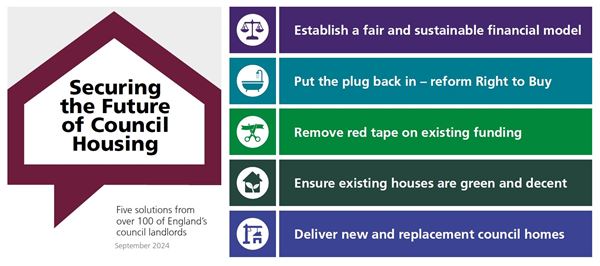More than 100 other council landlords teamed up at an event held in Westminster yesterday to jointly publish five solutions for the government to ‘secure the future of England’s council housing’.
 In July this year, 20 of the largest council landlords published an interim summary of their recommendations. Significant traction, including a meeting with the deputy prime minister, led to more than 80 additional councils backing their recommendations and signing the final report.
In July this year, 20 of the largest council landlords published an interim summary of their recommendations. Significant traction, including a meeting with the deputy prime minister, led to more than 80 additional councils backing their recommendations and signing the final report.
This report, led by Southwark Council, sets out the road map to renew our country’s council housing over the next decade and critical policy changes for the realisation of the new government’s social housing ambitions.
It explains how an unsustainable financial model and erratic national policy changes have squeezed council’s housing budgets and sent costs soaring. Unless more is done soon, most council landlords will struggle to maintain their existing homes adequately or meet the huge new demands to improve them, let alone build new homes for social rent and support our tenants with help they need.
Rather than increasing supply, to support the above challenges, the reality is that some councils across the country will see a continuous reduction of their housing stock through Right to Buy sales, it is argued by council leaders.
The recommendations include urgent action to restore lost income and unlock local authority capacity to work with the new government to deliver its promises for new, affordable homes throughout the country.
The five solutions set out detailed and practical recommendations to the new government:
+ A new fair and sustainable Housing Revenue Account (HRA) model – including an urgent £644 million one-off rescue injection, and long-term, certain rent and debt agreements.
+ Reforms to unsustainable Right to Buy policies.
+ Removing red tape on existing funding.
+ A new, long-term Green and Decent Homes Programme.
+ Urgent action to restart stalled building projects, avoiding the loss of construction sector capacity and a market downturn.
These recommendations make up a plan for a ‘decade of renewal’, with local authorities and central government working together to get HRAs back on stable foundations, bring all homes up to modern and green standards, and deliver the next generation of council homes.
Cllr Caroline Jackson, deputy leader and cabinet member with responsibility for housing at Lancaster City Council, said: “As a social housing landlord, we are united with others in our commitment to ensuring that all our residents have access to safe, suitable and affordable homes. Across the country, councils are keen to build their stock of council housing for the sake of the health and community cohesion of their areas.
“While the national housing finance situation is precarious, the five solutions outlined in the ‘Securing the Future of Council Housing’ report offer the government a genuine opportunity to reverse this trend. Implementing these recommendations will enable us and other councils to maintain and modernise our housing stock to meet contemporary safety, health, and environmental standards, while also delivering more much-needed affordable housing for our area and its communities.”
Cllr Stephen Simkins, leader of City of Wolverhampton Council, commented: “Our new government has committed to delivering the biggest increase to affordable and social housing in a generation. The deputy prime minister’s recent announcements demonstrate that they know the critical role councils will play in reaching this ambition. However, the reality is that our national council housing finances are on the brink.
“These five solutions offer the new government an opportunity to turn this around – lifting the council homes we have up to modern, safe, healthy and green standards, and delivering the thousands more council homes that our country urgently needs. By investing in them together, we can transform lives for the better for generations to come.
“It is important we have robust delivery plans to accelerate housing development and improvements that will support inclusive economic growth and focus on people and our plans to support our residents by creating good homes in well-connected neighbourhoods.”


Comments are closed.